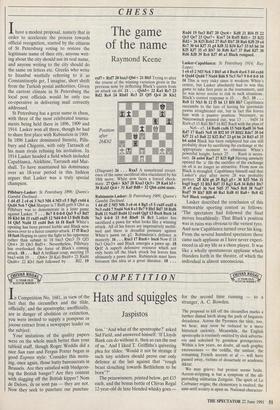12 YEAR OLD SCOTCH WHISKY
Hats and squiggles
Jaspistos
112 YEAR OLD SCOTCH WHISKY In Competition No. 1681, in view of the fact that the circumflex and the tilde, officially, and the apostrophe, unofficially, are in danger of abolition or extinction, you were invited to supply a pompous or Jocose extract from a newspaper leader on the subject. Your imitations of the quality papers were on the whole much better than your tabloid stuff, though Roger Woddis did a nice Sun rant and Fergus Porter began in good Express style: 'Consider this morn- ing, once again, those batty bureaucrats in Brussels. Are they satisfied with bludgeon- ing the British banger? Are they content with slagging off the British kipper? Nom de Delors, ils ne sont pas — they are not. Now they seek to puncture our punctua- tion."And what of the apostrophe?' asked Sid Field, and answered himself: 'If Lloyds Bank can do without it, then so can the rest of us.' And I liked T. Griffiths's quivering plea for tildes: 'Would it not be strange if such tiny soldiers should prove our only defence at the last against that "rough beast slouching towards Bethlehem to be born"?'
The prizewinners, printed below, get £15 each, and the bonus bottle of Chivas Regal 12-year-old de luxe blended whisky goes — for the second time running — to a stranger, A. C. Bowden.
The proposal to kill off the circumflex marks a further dismal lurch along the path of linguistic decadence. Across the Pyrenees the tilde, too, we hear, may soon be reduced to a mere historical curiosity. Meanwhile, the English apostrophe is routinely omitted by slick advertis- ers and solecised by gormless greengrocers. Within a few years, no doubt, all such graphic excrescences — the cedilla, the umlaut, the remaining French accents et al — will have passed away, victims of desuetude or academic diktat.
We may grieve; but protest seems futile. Accent-stripping is but a symptom of the all- pervading utilitarian Zeitgeist. The spirit of Le Corbusier reigns; the elementary is exalted; the sans-serif society is upon us. National character- istics are progressively ironed out in the name of convenience: McDonald's comes to Moscow, the litre to London, television to Timbuktu. We are, alas, all global citizens now.
(A. C. Bowden) From the wines on domestic tables to the agents at the helm of government, a society reflects its members' capacity to select and discriminate. Yet without constant exercise such powers will atrophy; and, as such, it is no mere whining pedantry to deplore the assault on the humble circumflex and tilde, or to mourn the en- dangered status of the apostrophe, which symbolically, some might think — prevents personal possession of attributes and goods (the fruit, perhaps, of no little reflection and re- sponsible choice) from being merged within a grey and undisceming plurality.
The wise citizen knows how each such loss, so slight in appearance, strengthens the Great Anarch's hand. To link minute linguistic distjnc- tion with, say, victory over inflation might, like the wheels of the penny-farthing, seem an incongruous coupling. Yet small wheels too have their essential part to play. To neglect their upkeep is to head for a fall indeed.
(Chris Tingley) Whither the cedilla? What price the umlaut? With the imminent extinction of the tilde and the circumflex in their native lands, it behoves those of us who speak that glorious magpie tongue that ig English to fight as hard to preserve endangered orthographical species as we have done hitherto to safeguard ornithologic- al ones. As with the ospreys of Loch Garten or the Cornish chough, it is high time we mounted round-the-clock watches to ensure that such exotic and delightful representatives of our lexical legacy as naïve, facade, fete and pifia colada retain their full panoply of diacritical marks. To reduce a succulent goose-liver pâté to a mere pate would be a bald prospect indeed. We humbly suggest that Mr Major have a tete-a-tete with his colleagues (perhaps over a soupcon of Cotes-du-Rhone) to come up with a rescue package. (Peter Norman) An acute problem? A grave crisis? Perhaps not, if only the circumflex is under threat of extinc- tion. We can always find alternative ways of describing George Robey eyebrows. And are we wedded to the tilde 'til death us do part? No. We are free to change partners and embrace con- sonantal 'y'.
But 'why?' is the question. As EC nations seek a community role (a word already shorn of its accent on the cross-channel passage) they shed outward distinctions perhaps only more obstinately to preserve their secret identities. Will the tabooed diacriticals live on in a half- world of thrilling subterfuge, like pornography or outlawed politics, more vital than if they had suffered a natural death like the British apos- trophe, more precious than the legal cedilla?
Only time will tell, and the wait could be long. We predict that the French, finding this affront
to their linguistic autonomy fdcheux, will resist. Spaniards may accept the change — manna.
(Basil Ransome-Davies)
The tilde stands condemned, and, short of an eleventh-hour pardon communautaire, will fol- low the circumflex into oblivion. No doubt the cedilla and umlaut will also succumb.
These modest accretions to our alphabets no doubt added to the gaiety of nations, but this is hardly the strongest argument for mercy. Any appeal must be on a point of principle: the principle of market forces against the tyranny of dirigisme.
How much better we British order these things. The apostrophe is a case in point. We do not doubt that it will disappear, seeking neither to detain it nor to hasten its going. It will go quite naturally, when there is nobody left who understands its use. That day is not far off, and when it arrives we should not grieve, but rather rejoice that the invisible hand of Adam Smith has struck once more.
(Noel Petty)



























































 Previous page
Previous page